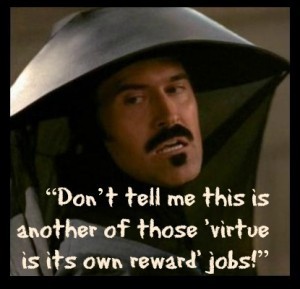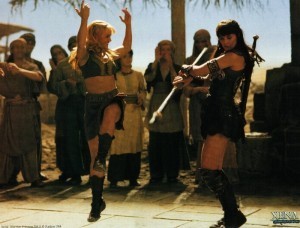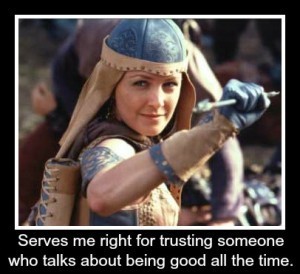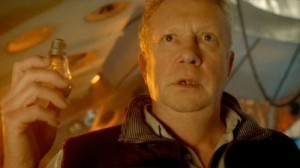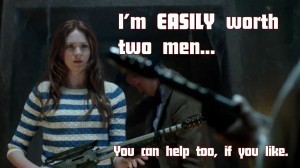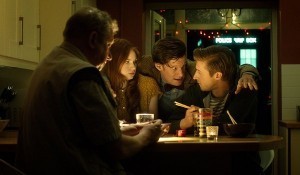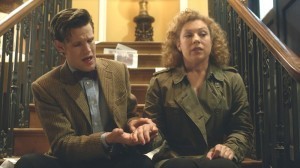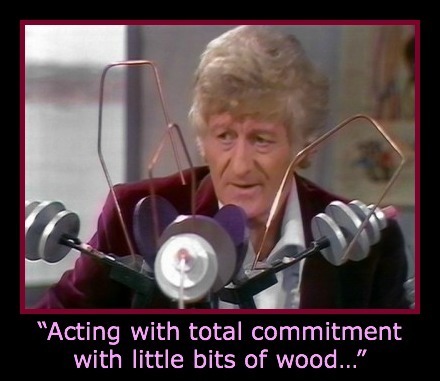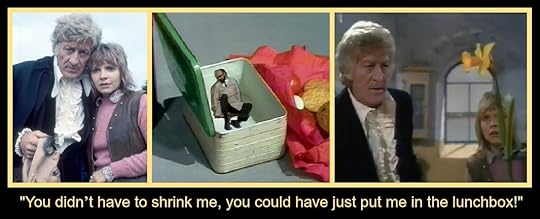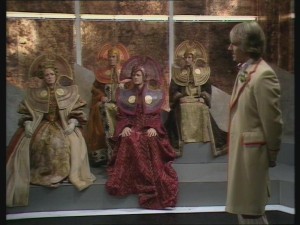Tansy Rayner Roberts's Blog, page 90
January 17, 2013
Friday Links has its Rollerskates On
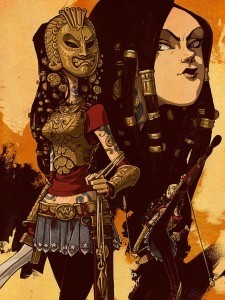 Remember roller skates? Remember disco? Too young or too old or just right to care about either of those things? It doesn’t matter because the Rollercade Glow Party wants you anyway! The anthology ‘Glitter and Madness,’ a co-production between the editors of Apex and Electric Velocipede has just gone live as a Kickstarter, and I’m one of the authors committed to producing crazy glittery roller derby gold. No pressure or anything.
Remember roller skates? Remember disco? Too young or too old or just right to care about either of those things? It doesn’t matter because the Rollercade Glow Party wants you anyway! The anthology ‘Glitter and Madness,’ a co-production between the editors of Apex and Electric Velocipede has just gone live as a Kickstarter, and I’m one of the authors committed to producing crazy glittery roller derby gold. No pressure or anything.
The Glitter and Madness website can be found here, and you can like them on Facebook or follow them on Twitter at @glitzymadness. More to the point, you can support the project for as little as $10. Help make the glitter madness happen!
But what else has been happening on the internet lately? As we discussed on the latest episode of Verity! it was Delia Derbyshire Day in the UK recently. Was there ever a name more suited to having a day in its honour? I kind of want someone to write the Delia Derbyshire Murder Mysteries now…
The Mary Sue showcases a military design for Wonder Woman based on Scythian armour.
Lisa Hannett writes about Australian horror and gothic fiction.
I can’t resist any Vestal Virgin related news ever, so check out the real recreation of their very complicated hair styles as depicted on statuary. Lovely stuff, though I’m not convinced about the argument that they had to have waist length hair to make the look work, not with the common use of wigs in the ancient world.
Speaking of hair, there’s a new X-team in town and it’s all women! I love this idea, especially with the long history the X-books have of multiple awesome women in a single team. The comments made me despair a bit, though – amazing how many comics fans really GENUINELY think that the reason they are uncomfortable with this book is because they don’t like how Storm’s hair is presented on the cover, or that it’s possibly being sexist against Wolverine.
Also, Jubilee as the main protagonist! As a comics reader who first learned about the X-Men thanks to the 90′s cartoon, this hits all my buttons.
Paul Cornell has announced the cancellation of his alien-invasion-and-politics comic Saucer Country. I’m sorry to hear that as I just caught up on the first trade collection and really enjoyed his fresh modern take on what has become a pretty hackneyed modern mythology – I certainly think anyone interested in trying new things before nominating in the Best Graphic Novel category of the Hugo’s should check it out. [Warning, though, it does contain rape themes - I think it does so responsibly (and hard not to when dealing with the complete mythology of alien abductions) but I understand many people may prefer not to read it for that reason.]
Speaking of Hugo nominations, if you can never think of what to put in the Fan Artist category, check out Katy Shuttleworth’s Tumblr page – you probably have already seen her work across the place, notably on covers for Chicks Dig Time Lords etc. but her general fan art is pretty awesome.
Kasey Edwards talks about the advice given to her by her first agent: to pretend to be a man in order to have a better writing career. Cue much headdesking. The comments are… mixed.
The Australian Women Writers Challenge is continuing with its great recap posts of the trends in reviewing for the project over last year. The Short Story Collection post includes some nice comments about Twelfth Planet Press and a shout out for my own Love and Romanpunk!
Narrelle reviews the Invasion exhibition currently travelling around Australia: TV and film costumes and props and a lot of science fiction goodness. Too much to hope it’s coming to Hobart I suppose?
Another gem from the Mary Sue: 8 female-led historical TV series that would totally work!
If you haven’t been watching the Lizzie Bennet Diaries, they are up to a good bit – Lizzie’s visit to Pemberley! I am loving the cleverness of this series, and the way they have modernised it so that many of the more business-like transactions of the original book are more about women’s work than marriage. Though of course there’s some love stuff in there too…
January 16, 2013
Virtue is Its Own Reward [Xena Rewatch 4.5-4.8]
Any episode with Caesar and Pompey is worth watching. Right? This one also has the bonus appearance of Max from Neighbours who would later take on the role of Hades, but for now is playing a random deserter soldier with a family to protect. The “filthy civil war” of the Romans has come to Greek territory (repeat after me, “anything BC is good”), and a lone village has to muster the troops to defend their own land, with the help of Xena and Gabrielle.
There are plenty of dull bits in the first half of this one but Karl Urban’s Caesar more than makes up for it – and while it feels like we have to wade through a lot before we get to enjoy him on screen against Jeremy Callaghan’s Pompey Magnus and Xena herself, it is worth it.
It looks like a by the numbers story right up to the point where Xena, Pompey and Caesar all fall into their own bottle episode down a deep dark well, leaving the armies to fight without them.
Gabrielle, who has been quietly filed away in a little ‘war and taking lives is bad’ subplot, suddenly comes into her own, leading the villagers into battle, killing with the ruthless calm of Xena’s apprentice, and making the tough calls. She’s scary good at it and here it is, the story of how far she’s come.
The battle scenes are good, far better populated than most of what we got in HBO’s Rome a decade or more later, and appropriately nasty. Gabrielle even gets to see some other kid lose his “blood innocence,” and a family man slaughtered on the battlefield along with everyone else.
Perhaps the most poignant bit is the scene when Caesar and Pompey climb out of their well to discover that both of their armies have wiped themselves out, the field littered with dead bodies in Roman armour. They both shrug, and go back to the drawing board. While Gabrielle and Xena agonise about the real people lost, the two generals are still behaving as if their armies (and anyone who gets in their way) are chess pieces to be lightly sacrificed.
Wonder if any of these themes are going to turn out to be very relevant this season?
What better to wash away all the blood of the last episode but a little dance music?
Tara, the bratty Goth girl who tried to replace Gabrielle as the sidekick back in Season 3 has made a life for herself in a desert town but causes scandal when she breaks the one law in town: dancing.
We don’t know why Xena and Gabrielle are suddenly “so far from home,” and it’s all a bit suspicious that the love of dance is suddenly so essential to Tara’s backstory when it wasn’t mentioned before, but what the hell. This is Xena does Footloose, just go with it.
“Ever since I found out that it’s not allowed… I’ve never wanted to dance so badly in all my life.” (Gabrielle)
A mysterious anti-dance preacher rolls into town, who turns out to be who else but AUTOLYCUS, KING OF THIEVES! For once this isn’t one of his scams – Xena has rolled him in specifically to solve the problem in the town which is making Tara so unhappy.
There isn’t much here, but there is a certain joy in watching Bruce Campbell’s wild evangelist rant against the evils of dance while managing to make it ten times as appealing to the on-the-edge-of-rebellion town. Xena and Gabrielle’s dance routine (while teaching the youth of the town “military training” is pretty entertaining, too.
But mostly it’s fluff.
4.7 Locked Up and Tied Down
It’s amazing this doesn’t happen more often. One of the presumably plentiful arrest warrants out for Xena from her Bad Hair Days finally catches up with her, and she submits to a trial and then to life imprisonment on the charmingly-named Shark Island, a women’s prison.
Yes, it’s Xena Cell Block H!
Grim and relentless as this story is, with emphasis on the personalities of hardened criminals, prison guard abuse and some very doom-laden weather, it’s also an important reminder that Xena’s heroic position in this world is ultimately untenable. She can be as moral and virtuous as she likes, but she has committed some terrible crimes in her past, and you don’t always get to choose your own punishment for your crimes just because you’re the main protagonist.
Gabrielle is pretty miffed about the whole thing, pulling out good old chestnuts like the ‘greater good’ argument, and Xena pragmatically shuts her down because, you know. Guilty as charged.
I do find it interesting that the death used to actually incarcerate Xena is that of a young woman, and one who apparently ‘shone with hope and beauty,’ yet another analogue to Gabrielle. The whole moral distinction about Bad Hair Xena never murdering women or children, and the murder of women and children being considered so much worse than that of men, is really not sitting right with me. I mean, Bad Hair Xena was an invading general, she rode into village after village, attacking civilians in an unprovoked manner.
 Sure, you can give some leeway to a soldier who kills as an act of war, but when that person is the one who MADE the freaking war? I don’t think she should be let off for all the untrained farmers and shepherds she killed, really, just because they were men.
Sure, you can give some leeway to a soldier who kills as an act of war, but when that person is the one who MADE the freaking war? I don’t think she should be let off for all the untrained farmers and shepherds she killed, really, just because they were men.
In any case, the episode has a great premise, and a powerful one, which is that Xena totally deserves to be sent to prison, and accepts this as her fate. It’s also a bleak episode which includes violence to prisoners, violence between prisoners, and some freakish scenes involving Xena being tortured by rats. Then there’s the murder she went into prison for, which is also delightfully gory. She killed the young woman in question, Thalassa, by cutting her face open and leaving her for some flesh-eating crabs to eat.
Gruesome stuff, but also the literal get-out-of-jail-free card, because it turns out that Thalassa is completely alive, though terribly scarred and mutilated, and running the prison. The whole thing was a scam to see Xena punished for the crime of being a heinous bitch.
Though to be fair, if someone had chained me bleeding to some rocks with flesh-eating crabs, I’d be pretty pissed off too.
Gabrielle tries to free Xena (while managing to soothe Thalassa’s tortured soul along the way), nearly gets herself hanged, and proves a worthy excuse for a prison break out.
Xena wrestles with rats that are trying to eat her alive, remembers at the last minute that she’s actually pro law and order, and manages to save Thalassa from being horribly executed by her own violent prisoners. The whole thing is wrapped up suspiciously quickly, but that came as something of a relief.
The key to this one comes at the end when Gabrielle suggests that it might be time Xena forgive herself for all of her horrible past deeds (seriously, I’d be asking questions about flesh-eating crabs at this point!) and Xena says “I don’t do that.”
Xena can never truly forgive herself for her dark past, and will punish herself sufficiently while riding around having adventures and fighting crime that she doesn’t need to be punished in any official way? Okay, then, if you ARE the show’s premise I guess I can accept it…
I’m almost certain it’s not foreshadowing anything big that’s going to happen this season.
Funny, I thought to myself. I remembered this season being a lot more annoying and redolent with faux-spiritualism than it’s been so far. And then I saw that the next one up was “Crusader.”
Oh, show.
Having killed off both Callisto and Hope, the production team have obviously been trying out a few different female villain archetypes. And this is one of the glories of this show, of course – LET’S HAVE MANY DIFFERENT FEMALE VILLAIN ARCHETYPES.
Callisto was very much a shadow version of Xena, a monster of her own making, though she had become a rich and complex character in her own right. Najara is also a reflection of Xena, if anything far more precisely than Callisto. She is the anti-Xena, a pious and beautiful blonde woman who rides at the head of an all-male army in the name of pursuing ‘good’ across the land.
She’s sweet, she’s patient, and she has really great hair, possibly because she also has a kicking battle hat. She looks good in armour. Sure, she talks to invisible djinn who live inside her head, but no one’s perfect. Gabrielle, of course, is drawn to her as she often is drawn to powerful women (it’s her type!) and Xena is suspicious but prepared to come along for the ride, for now.
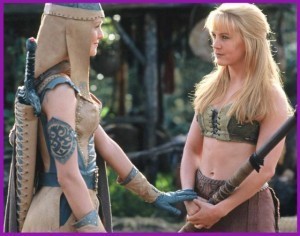 Najara is very much set up as the battle leader who is better for Gabrielle than Xena – light rather than darkness, spirituality and love rather than angst and cynicism. She also offers Gabrielle a chance to genuinely help people her way, instead of by copying Xena’s methods. Talk about killing with kindness!
Najara is very much set up as the battle leader who is better for Gabrielle than Xena – light rather than darkness, spirituality and love rather than angst and cynicism. She also offers Gabrielle a chance to genuinely help people her way, instead of by copying Xena’s methods. Talk about killing with kindness!
And of course, Xena has a reason to separate herself from Gabrielle. The vision which gave her hope back when she thought Gabs was still dead is now torturing her – an image of herself and a short-haired Gabrielle tied to crosses, about to be executed by Romans in the snow. Is it any wonder she is tempted to send Gabrielle off with Najara to live somewhere hot, happy and fulfilled for the rest of her days?
Even in the cheeky hot springs & massage scenes, and occasional sly one-liners, there’s always been a sense in the show so far that they’re holding back from making the Xena/Gabrielle relationship overtly romantic. But that has been less and less convincing this season, from Xena’s rampant grief in Adventures in the Sin Trade to her passionate embrace with Gabrielle upon their reunion in A Family Affair (and Joxer’s obvious embarrassment at witnessing their raw emotion).
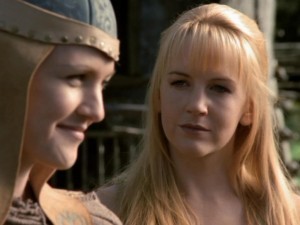 Never have Xena and Gabrielle been coded so clearly as a romantic couple as in this story, not necessarily because they are doing anything differently, but because of the sizzling chemistry between Najara and Gabrielle, and Xena’s subtle distress upon seeing it. It doesn’t feel like she is giving up her best friend to another woman, it feels like she is leaving her lover because she thinks someone else would be better for her.
Never have Xena and Gabrielle been coded so clearly as a romantic couple as in this story, not necessarily because they are doing anything differently, but because of the sizzling chemistry between Najara and Gabrielle, and Xena’s subtle distress upon seeing it. It doesn’t feel like she is giving up her best friend to another woman, it feels like she is leaving her lover because she thinks someone else would be better for her.
But there’s a reason I compared Najara with Callisto. She’s a villain, right? She’s just so NICE, it’s creepy and unnatural. And when Xena realises that the sweet, merry war leader has been running around executing all her prisoners (without a trial! Moral high ground from you, Ms Flesh Eating Crabs?) who do not turn to her “way of the light,” she runs back to liberate Gabrielle with one of those brilliant, classic Xena fights involving gimmickry, Asian movie tricks, and fabulous stunts.
The twist is that Xena loses. Najara kicks her dark side from here to kingdom come, and Gabrielle only saves her unconscious friend by, well, basically promising to love Najara forever. Yep, Najara wins the fight and the girl, and Xena loses everything including one of those good chewing teeth.
But of course Xena wins her girl back, the two of them trick Najara into thinking the rift between them is permanent, allowing Xena to use Gabs as leverage and win the next round. Najara is sweetly simpering, forgiving and convinced she is utterly right even as she’s being taken away by the fuzz for her trial.
XENA: She’s too dangerous a girl to leave on the loose. She likes killing too much.
GAB: But she beat you up so badly!
XENA: Well, that’s another reason.
Zealots. Man, they’re annoying. At least this one is gone and it can’t possibly get worse, right? I mean, they’re not going to spend the rest of the season having Gabrielle take moral high ground over Xena and start preaching about pacifism and ‘the way,’ right?
That would be crazy sauce.
CHAKRAM STATISTICS:
People who want romance with Xena: 13
People Xena allows to romance her: 7
Xena dead lovers: 3
Gabrielle dead boyfriends: 2/7
“Adorable” children: 37
Babies: 5
Babies tossed humorously in the air during fight scenes: 6
Xena doppelgangers: 4
Xena sings a mourning song: 6
Gabrielle sprained ankles: 2
Xena dies: 3
Gabrielle dies: 4
Characters brought back from the dead (incl. ghosts and visits to the Underworld): 50
Ares loses his powers and goes all to pieces about it: 2
Xena or Gabrielle earns money: 2
Xena or Gabrielle spends money (or claims to have money to spend): 7
Out of the Pantheon: Morpheus, Ares, Hera, the Titans, Hades, Celesta, Charon, the Fates, Bacchus, Aphrodite, Cupid, Poseidon, the Furies, Discord,
The Celebrity Red Carpet of the Ancient World: Pandora, Prometheus, Hercules, Iolaus, Sisyphus, Helen of Troy, Paris, Deiphobus, Menelaus, Euripides, Homer, Autolycus, Meleager, Oracle of Delphi, David, Goliath, Orpheus, Julius Caesar, Brutus, Ulysses, Penelope, Cecrops, Boadicea, Cleopatra, Crassus, Pompey
Previous Xena Rewatch Posts:
Warlord is a Lady Tonight
I Don’t Work For Money
Amazon Wanna Take A Ride?
Go To Tartarus!
Swashbuckle and Shams
Death In A Chainmail Bikini
Full Moon It Must Be Xena
How Do You Mortals Get From Day to Day?
The Future is Archaeologists
Divide and Conquer
My Sword is Always Ready to Pleasure You
Hide the Hestian Virgins!
Lunatic with Lethal Combat Skills
Coping with Your First Kill
Sweet Hestia, I’m In a Den of Filth
The Bitter and Sweet of It
Because Caesar Was Taken
Armageddon When??
Rolling Around Like Weasels
You Killed Me?
My Fungus Is Spreading
Verity! Too
 The new episode of Verity! is available for download: Episode 2 This One Goes To Eleven. Deb, Erika, Kat and I talk about the Eleventh Doctor’s era as represented by ONE (count them, three) episode. We also talk a bit about Delia Derbyshire who now has a Day of her own.
The new episode of Verity! is available for download: Episode 2 This One Goes To Eleven. Deb, Erika, Kat and I talk about the Eleventh Doctor’s era as represented by ONE (count them, three) episode. We also talk a bit about Delia Derbyshire who now has a Day of her own.
Check out the supporting linkfest post, Things We Like – Bow Ties Are Cool Edition in which several of us have listed a bunch of things on the internet about Eleventy that we, well, LIKE.
And if you haven’t joined the 1200+ people who have listened to our Episode One – The Snowmen, there is still time! Podcasts don’t run away, they wait for you. Sometimes down back alleys with snow and teeth and bustles, but they still wait for you.
January 14, 2013
The Third Doctor’s Day [WHO-50—1972]
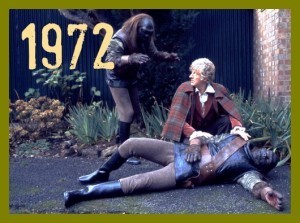 I always loved Jon Pertwee’s Doctor, maybe not best of all – I didn’t start to think of him as my favourite Classic Doctor until I was in my late teens – but his era was very special to me. I knew that Tom Baker was regarded as The Best Of All Doctors thanks to my early introduction to a small group of fans but also because most of my Doctor Who Received Wisdom came through my Mum. Who, by the way, loved Tom Baker like he was drizzled in chocolate.
I always loved Jon Pertwee’s Doctor, maybe not best of all – I didn’t start to think of him as my favourite Classic Doctor until I was in my late teens – but his era was very special to me. I knew that Tom Baker was regarded as The Best Of All Doctors thanks to my early introduction to a small group of fans but also because most of my Doctor Who Received Wisdom came through my Mum. Who, by the way, loved Tom Baker like he was drizzled in chocolate.
THERE IS A REASON TOM CAN NEVER BE MY DOCTOR, JUST SAYING!
I actually was only familiar with a small handful of Pertwee serials for many years – the ones my Mum had taped on VHS to keep, the ones she deemed important. (SHE TAPED ALL OF THE TOM BAKER STORIES, EVERY SINGLE ONE, EVEN PLANET OF EVIL)
I think of Season 10 as being ‘my’ period of the Jon Pertwee era, though in retrospect that’s probably because it’s the season with the most number of stories that were on our VHS collection at home in my childhood, and so the one I am most familiar with. That is, The Three Doctors, Carnival of Monsters and The Green Death, all of which run together in my head as something of a season on their own. I don’t know why my mother recorded Carnival of Monsters, as she tended to just keep ‘milestone’ stories with the Pertwee years, which means that for a very long time the only other stories I had seen of this era were Spearhead from Space, Terror of the Autons, The Time Warrior and Planet of the Spiders.
Not a completely unrepresentative view of the Pertwee era, though it does mean I don’t quite ‘get’ the common fan perspective of having a bunch of similar stories (mostly featuring the surprise that the Master was involved) all running together. “My Pertwee” was padded out with Target novelisations, which filled in a lot of the blanks much as they did for the First and Second Doctor era. With many stories, I didn’t see their TV format until a decade or more after I had first read them in book form.
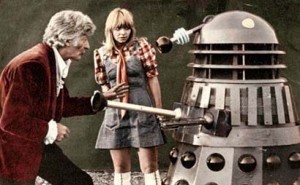 Season 9 (1972) is obviously a season which didn’t make much of an impression on my mother, as none of the televised stories in it are especially familiar from my childhood – I’m sure I watched both The Sea Devils and The Curse of Peladon when I was fairly young, but neither of them made much of an impression.
Season 9 (1972) is obviously a season which didn’t make much of an impression on my mother, as none of the televised stories in it are especially familiar from my childhood – I’m sure I watched both The Sea Devils and The Curse of Peladon when I was fairly young, but neither of them made much of an impression.
But Day of the Daleks, the first story of this season, was one of my all time favourite novelisations. I must have read it ten times before I finally saw it on screen – I may not have understood it, but I loved it. More than nearly any other Pertwee story, it felt like this was what Doctor Who was suppose to be. A time paradox story! With future dystopia, men from the ministry, brain hurty plotting AND adorable Jo outfits. Oh, and cozy chaps from UNIT – rank has its privilege indeed, Mr Yates!
Watching the new DVD of Day of the Daleks last year, I quite enjoyed comparing versions as far as the special effects go – one of the best things that you can count on with the restoration team is the way they always keep the original version on the disc, no LucasFilming going on here!
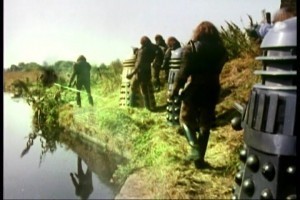 Still, while to some fans it might seem ‘inauthentic’ to have so many extra Daleks, laser beams etc., to me it goes some way to pulling the TV story up to the standard of the book. I usually don’t bother turning on a revised special effect, because I don’t see the point, but in this case I made an exception – and I especially enjoyed the establishing shots of the futuristic city, with its hints towards a Blade Runneresque society. Very nicely chosen designs that help a tiny bit in selling the idea that the studio scenes are happening in a nasty future instead of, well, a studio.
Still, while to some fans it might seem ‘inauthentic’ to have so many extra Daleks, laser beams etc., to me it goes some way to pulling the TV story up to the standard of the book. I usually don’t bother turning on a revised special effect, because I don’t see the point, but in this case I made an exception – and I especially enjoyed the establishing shots of the futuristic city, with its hints towards a Blade Runneresque society. Very nicely chosen designs that help a tiny bit in selling the idea that the studio scenes are happening in a nasty future instead of, well, a studio.
Target novelisations might be short but the special effects are awesome… sometimes that’s hard for a mere TV story to live up to without a little 2st century help.
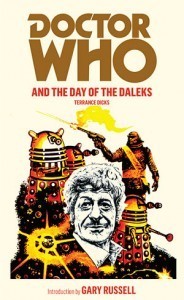 Day of the Daleks feels like the most Moffaty of the Pertwee stories – from the character banter to the timey wimey plot where guerrillas travel back to save their future, only to recreate it (basically the Terminator without the sex). All this and it’s a script which shows Jon Pertwee’s Doctor off at his best: Officious, clever, quippy and protective.
Day of the Daleks feels like the most Moffaty of the Pertwee stories – from the character banter to the timey wimey plot where guerrillas travel back to save their future, only to recreate it (basically the Terminator without the sex). All this and it’s a script which shows Jon Pertwee’s Doctor off at his best: Officious, clever, quippy and protective.
Jo is good in this too – very feisty and suitably out of her element in the Dalek-infested future. Even if she does crumble under interrogation – well, wouldn’t you? For the most part she’s running alongside the Doctor (or riding on the quad bikes), being just as brave as he is.
And surprise… this story doesn’t even have the Master in it! Considering this is the first time in five years that the Daleks had come back (is that the longest period they were away while the show was on the air? I believe it is! They never went past four years again), it’s a great story and the only really interesting use of the Daleks in the Pertwee era.
The special edition also features some great DVD extras – I do like it when they show us how much work they did on the restoration itself, and not just the making of details from the original filming.
Vocabulary Check: reading this book as a child taught me the meaning of the word ‘guerilla.’ Also ‘dalekanium.’
ELSEWHERE ON 1972:
Day of the Daleks [Wife in Space]
Curse of Peladon [TV Tropes]
The Sea Devils Episode 1 [Chronic Hysteresis]
The Sea Devils [Wife in Space]
The Mutants [Den of Geek]
The Time Monster [Wife in Space]
January 13, 2013
Domesticating the Doctor Part V: Divorcing the Ponds
The Christmas decorations are still up, we’ve only just started eating the pudding (if I’d known it only took 3 minutes in the microwave I might have cooked it on Christmas Day) but the festive season is pretty much over in our house. Time to chew over the 2012 Doctor Who episodes (Series Pond & the Christmas Special) with a couple of new installments of DOMESTICATING THE DOCTOR.
Previously on Domesticating the Doctor, we looked at our hero’s distaste of the domestic sphere throughout the Classic Years (with a brief holiday from it when he was Jon Pertwee), we looked at the three Mother-in-Law characters from the RTD era and how this new, rebooted version of our hero coped with jam, Christmas dinner and housing estates, we delved back into pre-war Britain with a very human Doctor, and finally we poked holes in his new Moffat era family with Marrying the Ponds.
Before I get to the 2012 episodes, I wanted to touch briefly on the Night and the Doctor shorts, which were released last year as part of the Series 6 box set, but which I personally failed to watch until somewhere around the beginning of Series 7. These little sketches not only answer some rather intriguing questions about the actual timey wimey physics involved in the Doctor’s marriage to River Song, but also expands on his relationship with Amy, cementing it once and for all as being far closer to a familial connection than anything else.
This Doctor doesn’t get why married people should want to share a bed, but is in his element when talking about his best friend’s childhood – children make sense to him in a way that grown ups don’t, and he seems far less threatened by their domesticity. If this wasn’t fully clear from The Doctor, the Widow and the Wardrobe (which probably deserves a post of its own, to be honest) in which the Doctor upcycles a house to be a child’s paradise but sneers at the functional adult rooms, it should certainly be clear from the scene in which he shows Amy the power he can have over her childhood and her memories, using only a theoretical ice-cream.
Also, as suspected, his marriage to River is full of gun battles, glamorous evening dresses, and nothing remotely domestic. Romance all the way, their style, but they’re not picking a dinner service together.
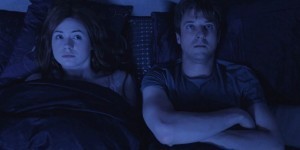 Another series of short sketches appeared just before the launch of Series 7a (or as Moffat referred to it, Series Pond): Pond Life laid out the theme of the first half of this season by showing how Amy and Rory’s grown up life is affected by the Doctor flitting in and out – there’s an Ood packing their lunches, and a Time Lord bursting in on them in the bedroom (again). It’s all funny and entertaining, but a little bit wrong.
Another series of short sketches appeared just before the launch of Series 7a (or as Moffat referred to it, Series Pond): Pond Life laid out the theme of the first half of this season by showing how Amy and Rory’s grown up life is affected by the Doctor flitting in and out – there’s an Ood packing their lunches, and a Time Lord bursting in on them in the bedroom (again). It’s all funny and entertaining, but a little bit wrong.
Why exactly is this Doctor trying to hard to keep Amy and Rory? He’s never done it before. Sure, it could be because he imprinted on Amy during his post-regeneration trauma [the first face I saw] but I’m not convinced that’s enough of an explanation. It has nothing to do with River, either, who doesn’t figure in Pond Life or most of this season.
The companions are growing up, and domesticity slowly swallows them whole and then spits them out again – the Doctor turns up one day to discover that they’re not home, something is wrong, and he missed the moment to fix it, even supposing he could have done so in the first place.
Oddly, this matters to him, in a way no previous Doctor would even have blinked at. Is this the first sign that the Doctor is getting old?
 Asylum of the Daleks was a shock to the system for many fans – not because of the big movie style drama and action of the piece, but because Amy and Rory’s marriage was on the rocks and at the point of divorce, suddenly and without warning.
Asylum of the Daleks was a shock to the system for many fans – not because of the big movie style drama and action of the piece, but because Amy and Rory’s marriage was on the rocks and at the point of divorce, suddenly and without warning.
And yes, it was dealt with in a rather shallow, too-quick kind of way in the story, but the tension between them was more than a ‘gasp, what has Moffat done’ season opener. The actual point of the relationship breakdown and the Dalek-inspired reunion was made quite clear by Amy who tells the Doctor firmly that this isn’t something he can fix “like you fix your bow-tie.”
I get very defensive of Amy, who seems to be a target for such a massive weight of criticism (some of it very gendered and problematic) and I was particularly concerned to see how many people watched the thirty second argument/making up of Amy and Rory Pond, and leaped to the conclusion that Amy was entirely at fault, and had broken up their marriage without having a single conversation with Rory about why she wanted to end it.
I didn’t get that at all from their exchange. In fact, when she raises her inability to have children (and we don’t actually know whether this is a physical or psychological barrier), he replies “I know” which implied to me that this was a conversation they had gone over more than once. The big difference in this particular version of that conversation was not Amy’s revelation (to the audience) about her motivation for kicking him out of the house, but Rory’s own inadvertent revelation that he believes his love for her is BETTER than her love for him – that he has always assumed this is an intrinsic fact of their relationship.
And, whoa.
I don’t actually think we should be critiquing what goes on in a fictional marriage any more than we should throw stones about real relationships, but I do think it’s worth noting that Rory (who can often do no wrong in fandom eyes) does not cover himself in glory in this exchange. Not only does he bring up the ‘waited 2000 years for you’ sacrifice to score points in a fight, but his lack of confidence in Amy’s love (which he probably always thought of as humble and self-sacrificing) is a form of terrible arrogance – as if he has the competitive moral high ground in their love story. This to me is just as problematic as Amy’s own arrogance in making the choice to ‘let him go’ so he can have imaginary children with some other person.
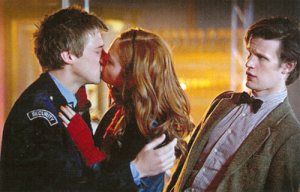 Note, I adore both Rory and Amy. I think they are both cute as buttons. I also think that they are not in their best emotional shape in their early twenties, at least partly thanks to the timey-wimey shenanigans they have gone through. And it’s important to recognise that there are faults on both sides here – they both have trust issues and forgiveness issues and have to get over all of that to be together. The strength of Series Pond is very much that it shows the progression from a relationship that is not-cooked-yet to a mature marriage that we can believe lasting for the rest of their lives.
Note, I adore both Rory and Amy. I think they are both cute as buttons. I also think that they are not in their best emotional shape in their early twenties, at least partly thanks to the timey-wimey shenanigans they have gone through. And it’s important to recognise that there are faults on both sides here – they both have trust issues and forgiveness issues and have to get over all of that to be together. The strength of Series Pond is very much that it shows the progression from a relationship that is not-cooked-yet to a mature marriage that we can believe lasting for the rest of their lives.
If Amy and Rory had drifted happily towards their final story without some sign of bumps in the road, especially after the trauma at Demon’s Run (and the emotional ramifications that we never did see dealt with on screen – no wonder they went off the rails as soon as the cameras turned their backs) then their Happy Ever After would have felt far less realistic.
People do stupid things in their early twenties. If they’re lucky, the world doesn’t end.
While we’re on Asylum of the Daleks, there was one element I did want to critique: I love Amy’s cranky Scottish fury at the world, but the slapping in this episode felt wrong. It was just as inappropriate here as in the Time and Space sketches a couple of years ago – Moffat’s writing has always shown a clear influence from old Hollywood banter movies, and this is usually a good thing (because, BANTER) but hitting within marriage isn’t funny in the 21st century, and it doesn’t make a lot of a difference that it’s the woman doing it.
At least when Lynda slapped Spike in Press Gang, he slapped her back. The same went for Starbuck and Apollo in Battlestar Galactica. In both instances it was shown as an example of a couple who see each other as equals regardless of gender – but Rory would never slap Amy in a million years (and no one would accept him doing so in Doctor Who) and it feels deeply uncomfortable to see that double standard played for laughs.
While I agree Doctor Who is not a children’s programme any more, I think it’s important to remember how many children do watch it, and there are some things that are irresponsible to make light of. Comedy marital violence is up there with rape jokes as things we don’t need to see in our escapist TV any more.
Ahem (steps off soap box)
So the marriage was patched up, and continued stronger than before, but the Doctor kept returning, colliding happily into the Ponds’ domestic normality on an irregular and unpredictable schedule, usually without so much as a by-your-leave.
This was certainly a fresh companion interaction, and one with great source for humour. Thanks to the clever writing of both Moffat and Chris Chibnall (seriously, who would have thought it) we got to see Amy and Rory grow into themselves as adults, falling in and out of the TARDIS in between domestic chores such as changing lightbulbs…
Dinosaurs on a Spaceship contained many glories, but adding Rory’s Dad to the canon of, well, companion parents (I guess I can’t call them Mothers-in-Law anymore) was a master stroke. Brian Williams embodies domesticity, a homebody who prides himself on a quiet masculine competence.
Meeting Brian, we understand more about Rory than we ever have before. It’s clear that his son being a nurse makes almost as little sense to Brian as does travelling among the stars, but also that they are deeply similar in the ways that matter – I loved the line especially about how Rory has been picking up space-tech with medical/first aid applications on his journeys, just as his Dad always has practical things in his own pockets.
Also, Brian never actually refers to the TARDIS as a shed (if you’ve never listened to the Lucie Miller/8th Doctor audios then her speech about it being a shed is pretty spectacular) but you just know from his final scene sitting on the doorstep of the TARDIS eating his sandwiches and watching the universe go past that he thinks of it as the ‘best shed ever.’
Meanwhile, Amy the action hero is getting better and better at the TARDIS adventures (in this story she takes on the role of the Doctor, naming Nefertiti and Riddell as her companions) and yet struggles to settle down in her everyday life. Even the Doctor, who usually does not pay attention to such things, notices that she keeps switching jobs (I was trying so hard not to be judgy, but TERRIBLY RELIEVED she was not a fashion model for ever) and seems mildly concerned about it.
Is it his fault that Amy can’t find an occupation she is satisfied with in the real world? Well, yes. Her short attention-span and trust issues are almost entirely down to him – especially when you take into account that the crack in her wall was at least partly his fault too.
Never mind, she still has some growing up to do.
It was The Power of Three where domesticity and the Doctor truly came back into focus, in something akin to a duel to the death. Guess who won, almost by default?
Here’s a clue: it wasn’t domesticity.
The plot resolution may have been a bit rubbish (as young Amelia might say), but the Power of Three was a wonderful penultimate adventure for Rory and Amy largely because it wasn’t a real adventure at all – it was a glimpse at how fractured their domestic life had become, with the Doctor’s many intrusions into it. They even got to experience (along with the audience) what it would be like if the Doctor stayed with them for a while instead of the other way around.
Irritating, mostly.
During the Year of the Slow Invasion, Rory and Amy made the decision to stop running away with the Doctor. It’s a great decision for them. It allows them to commit to work and friends and their real life in a way that they never have before.
Frankly, I was so convinced by the progression of this narrative, from the final mmadcap antics including That Western Episode and OMG Zygons in the middle of their anniversary party, to the Doctor agonisingly bouncing off the walls (and the Wii) when forced to stay in one place, and their evident happiness in being able to ‘be’ in one place and time long term, that I was genuinely shocked when Brian pointed out that Amy and Rory had in fact been fooling themselves the whole time, and loved the Doctor best.
It was necessary to the story arc, but didn’t feel natural to me. I wanted them to stay and have their nice ordinary life, because that’s what the successful companions *get* when they leave the TARDIS.
Of course, that is what they got in the end, but not by choice.
One of the most frustrating aspect of New Who for me, especially in the RTD era, is the idea that running around in the TARDIS is the sort of thing no one would ever want to stop doing, except under very dramatic circumstances – even Martha and Mickey, the two companions who did finish it on their own terms, were both presented as doing so largely because they were needed with their families rather than because travelling no longer appealed (and in both cases there’s also the sad but clear implication that they both feel they’re not as important to the Doctor as Rose – that neither of them feel like they really count as a companion).
I am not saying that we should have a companion who spends her whole journey through Oz bitching about wanting to get back to Kansas, but why shouldn’t a companion simply grow out of it, or decide that it’s time to stop wandering, or find a better option, without it having to be a tragedy of epic proportions? There must be a happy medium somewhere between Doomsday and sending Dodo to the country…
Travel is fun and awesome and exciting, but home is quite nice too. There’s something to be said for the comfort and reliability of domesticity. After the ‘there’s no place like TARDIS’ attitude of the RTD era, I was quite excited that this last run of Amy and Rory’s epic adventure wase presenting the idea that yes, you could just grow up and leave the TARDIS while you were all still friends, without it having to be a Big Deal. You could leave the TARDIS (more than once) and still keep in touch with the Doctor…
But of course, this is a drama series. So, drama. And instead of the quite natural domestic end to Amy and Rory’s travels which maybe should have happened in The Power of Three, we got The Angels Take Manhattan which forced the Ponds and the Doctor apart forever.
What I liked best about The Angels Take Manhattan was the 1930’s style Hollywood romantic comedy banter, not just between the Doctor, Amy and Rory but also between the Doctor and River. More than any previous story this is the one that tries to define how the Doctor and River’s marriage works, and indeed what Amy and Rory’s marriage has become. It’s a love letter to the idea that being practical with another person, and finding a balance together over a number of years, is actually just as romantic as all that eyes-across-a-crowded-room business. This is refreshing considering how often romance in traditional drama is weighted towards the BEGINNING of a love story, rather than the comfortable middle.
This 30-something Amy and Rory have managed to find a comfortable middle of their relationship despite being back in the TARDIS – the impression from the scenes of them picnicking in New York is that they are no longer compromising their marriage for the Doctor despite living in his world – the three of them have a companionable friendship, but the boundaries marking out Amy and Rory as a unit are very clear.
River and the Doctor display far less of that easy comfort with each other. They are still figuring things out, and she displays some wariness and mistrust about their relationship. The line about not showing the damage and the bitterness about his eternal baby face is a rare glimpse of her feelings beneath the banter. I think it’s important that we see that this dizzy, weird marriage of theirs is battered in places. River and the Doctor are sweet together, but they also pretend to know each other a lot better than they actually do – and that’s so much more interesting than if they were flawlessly in love.
The Doctor seems to relish having a wife, which is an extraordinary shift for him. It’s half a joke, but he is not just going through the motions. River is his wife, and he accords her that status, even if his idea of what a wife is owes a little too much to old Thin Man movies.
More to the point, right after he has lost Amy and Rory and is devastated by that loss, the Doctor asks River to move in with him. But is he asking her as his wife or just another companion? Does she turn him down because she thinks it’s the only way to keep him interested? Or does she mean what she say that them living together would be disastrous?
The Doctor has to have known that by making that offer, he was changing what appears to be the definition of their marriage – having had a brief flirtation with the idea of the TARDIS being the home of one married couple, he’s now trying to repeat the experiment.
He’s not ready to let go of his family, not yet. But River won’t play ball.
Meanwhile, in the unfilmed coda published on the web in the wake of Amy and Rory’s departure, it is revealed that they adopted a son and ended up with the work-domesticity balance they were trying to achieve in the 21st century all along. Amy even finds her true calling, tapping away on a 1930’s typewriter.
All they needed to build a life was to be forcibly separated from the Doctor.
While the tragedy of Melody Pond’s abduction was never entirely resolved, the specific time and place in which Amy and Rory were ‘trapped’ also does not close the door on the possibility that they were able to be reunited with their child for at least some of her childhood, in the mysterious gap between her escape from the Silence and the space suit in the 1960’s, and her turning up to share their childhood in Leadworth in the 1990’s. For at least some of that time, she was in New York…
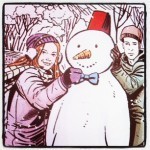 The latest issue of Doctor Who Magazine features a short Christmas comic, “Imaginary Enemies,” written by Scott Gray, featuring a vignette from Amy, Rory and Mels’ childhood in which they fight a monster on their way to the school nativity play. On the final page, in a farewell to the Ponds we see a series of snapshots from their life, both professional and domestic, through the 20th century in America. My favourite is the image of them building a snowman by the bridge in Central Park, with a bow-tie and a fez on it.
The latest issue of Doctor Who Magazine features a short Christmas comic, “Imaginary Enemies,” written by Scott Gray, featuring a vignette from Amy, Rory and Mels’ childhood in which they fight a monster on their way to the school nativity play. On the final page, in a farewell to the Ponds we see a series of snapshots from their life, both professional and domestic, through the 20th century in America. My favourite is the image of them building a snowman by the bridge in Central Park, with a bow-tie and a fez on it.
It looked for some time like the story of the Doctor and the Ponds was going to be a gentle drifting apart rather than a short, sharp divorce. But they just couldn’t quit him and more to the point, he couldn’t quit them.
Something big, yet again, had to separate them, and while the actual mechanism for this makes little sense (everyone and their robot dog have pointed out that all Amy and Rory have to do is step outside New York to meet up with the Doctor again) it is a convenient excuse to release the actors and the characters back into the world.
Between The Power of Three and The Angels Take Manhattan, the thousand-plus-year-old Doctor is more open to domesticity than he has ever been, even taking the cozy UNIT years into account.
Is this just a phase, or does it mean something very new for our hero?
Tune in next week for: Souffles in the TARDIS!
[Cross-posted at Doctor Her.]
January 10, 2013
Friday Links is Doing Something Right
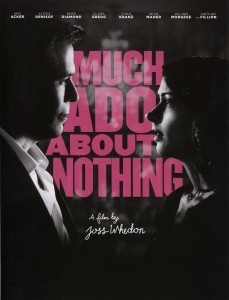 Apparently the secret to being successful at social media is about promoting other people rather than yourself. Finally, something I’m doing right!
Apparently the secret to being successful at social media is about promoting other people rather than yourself. Finally, something I’m doing right!
Joss Whedon talks about Much Ado (it’s coming!) and why taking a creative shift can be as good as a holiday!
The AWW Challenge blog has been posting a great series of genre/theme-specific wrap ups of the year’s reviews, including speculative fiction, diversity, romance and erotica, young adult and many more.
Tobias Buckell on Things I Told my Intern (about being a writer)
Tasmanian romance writer Sarah Brabazon talks about life onboard a yacht with her family.
Marianne De Pierres’ space opera series Sentients of Orion is finally being published in the US! She talks about her inspiration for the books here.
Ursula Le Guin on the Sartre Award, given to people for turning down awards. Yes, really!
Big Finish Audio have announced their big anniversary special: a massive two hour production involving all five of ‘their’ Doctors: Tom Baker, Peter Davison, Colin Baker, Sylvester McCoy and Paul McGann. As I said on Twitter – sure, having Tom along with the other chaps is exciting, but I’m actually a bit MORE excited that Charley Pollard is going to be reunited with the Eighth Doctor again.
The Angriest on why The Time Meddler is such a classic and important story of 1960′s Doctor Who.
Rowena Cory Daniells passed on this great link about why anyone who cares about gender and literature should pick up a children’s book. Now.
i09 on How to Write Fiction For Money Without Selling Out Too Much.
I hadn’t heard of the Nice Guys of OKCupid Tumblr until after it was taken down, but at least there’s still Nice Guys of Westeros.
Over on the Huffington Post, Foz Meadows talks about Sexism vs. the Costa Prize:
The sheer scope of misogyny on offer is simply staggering — and all from a group of men provoked to outrage by the mere suggestion that sexism still exists!
And Super Best Friends Forever may not be coming back this year (SOB!) but this DC Nations series looks pretty promising:
January 9, 2013
Domesticating the Doctor IV: Marrying the Ponds
Originally published at Doctor Her on 16 April 2012, which is why it doesn’t reference Season 7 at all.
The Eleventh Doctor crashes literally in Amelia Pond’s back yard, and from that point on is irretrievably tangled in her life and her family – though with the exception of dancing with them (presumably) at her wedding he remains largely apart from, and free from any association with her parents and aunt. Indeed, the whole of season 5 not only has Amy’s family literally removed from her life (a mystery to be solved by the Doctor) but frames the Doctor himself as her imaginary friend, a character who, in the land of child logic, would never interact with her parents and guardians anyway.
The Doctor has always been an abductor of young people, but in The Eleventh Hour we see him set up as an ostensible kidnapper of children. He not only gets himself invited into her house at night, he agrees to take young Amelia off on adventures with him, without any kind of permission from the adults responsible for her.
The Eleventh Hour is for me one of the most perfect pieces of Doctor Who storytelling of all time, but my inner parent is still going, HANG ON A MINUTE. It also raises all kinds of interesting questions of where he got hold of Susan in the first place, back in the 1960’s…
The Doctor’s first main scene with young Amelia, in which he tries all the foods and spits them out in dramatic fashion, demonstrates quite clearly that he is still a fish out of water in a domestic environment (and shouldn’t be let out in public).
Like Rose, the adult Amy alternates between dragging the Doctor into her domestic life, and using him to escape it. Amy’s house is a symbol of domesticity gone wrong: the house with missing family members and too many rooms. In that first episode, there’s a monster hiding in a room she can’t even remember, let alone see – and the Doctor can see her house more clearly than she can.
 At the end of the Eleventh Hour, the big reveal is that Amy, who may or may not have “something” to come back for in the morning, has hightailed it out of her spooky house with the Doctor, leaving behind a certain wedding dress. We return later that same night, at the end of Flesh and Stone, because Amy thinks the best place to proposition the Doctor is back at hers, rather than the far more convenient TARDIS. Why there? Was she expecting him to dump her and wanted to make sure she was back where she started? Or was the TARDIS emanating some kind of ‘no unmarried nookie in here thank you’ magnetic field?
At the end of the Eleventh Hour, the big reveal is that Amy, who may or may not have “something” to come back for in the morning, has hightailed it out of her spooky house with the Doctor, leaving behind a certain wedding dress. We return later that same night, at the end of Flesh and Stone, because Amy thinks the best place to proposition the Doctor is back at hers, rather than the far more convenient TARDIS. Why there? Was she expecting him to dump her and wanted to make sure she was back where she started? Or was the TARDIS emanating some kind of ‘no unmarried nookie in here thank you’ magnetic field?
It’s fascinating that the Doctor goes to so much trouble to set up Rory and Amy in The Vampires of Venice, in response to her failed seduction. I know there are some who might view this as him being all patriarchal, but I think his general comedic incompetence balances out his assumption that he knows what’s best for them. He doesn’t understand how humans work, especially the romantic aspects, and his bumbling attempts serve to show how alien he really is. It’s certainly preferable to how the Tenth Doctor dealt with Martha’s feelings for him by ignoring the issue.
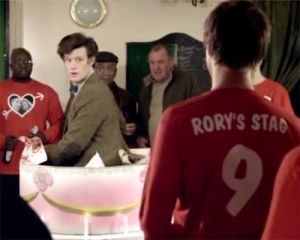 The Eleventh Doctor isn’t completely dense, though. He figures out that Amy and Rory’s relationship won’t survive her having otherworldly adventures without him (much as travelling in the TARDIS changed Rose into someone her mother almost didn’t recognise) but he is still flailing blindly in the dark. The obvious solution – to leave Amy with Rory and start again with a new companion – doesn’t occur to him. Instead, he’s determined to keep Amy even if that means bringing her feller along with him. Something he never offered any of his previous companions… and a good thing too, really, or (back in the 70′s) Jo Grant would have had a TARDIS full of alien toyboys by the time Cliff Jones came along.
The Eleventh Doctor isn’t completely dense, though. He figures out that Amy and Rory’s relationship won’t survive her having otherworldly adventures without him (much as travelling in the TARDIS changed Rose into someone her mother almost didn’t recognise) but he is still flailing blindly in the dark. The obvious solution – to leave Amy with Rory and start again with a new companion – doesn’t occur to him. Instead, he’s determined to keep Amy even if that means bringing her feller along with him. Something he never offered any of his previous companions… and a good thing too, really, or (back in the 70′s) Jo Grant would have had a TARDIS full of alien toyboys by the time Cliff Jones came along.
Amy’s Choice is one of several stories in Season 5 to deal overtly with the issue of the human desire for domesticity vs. The Doctor’s aversion to it. There are two dreamworlds created in this story, one recreating the TARDIS and the other recreating the life that the Doctor thinks Amy and Rory want for themselves. You’ll note that he’s already thinking about the fact that someday, Amy and Rory will leave him to settle down planet side. Of course they will. The companions always do.
 So dream Amy is pregnant, dream Rory is a qualified GP with a silly ponytail, and they are living in an idyllic but deeply boring country village. The dullness is accentuated by the fact that the characters actually fall asleep as they shift between dreamworlds.
So dream Amy is pregnant, dream Rory is a qualified GP with a silly ponytail, and they are living in an idyllic but deeply boring country village. The dullness is accentuated by the fact that the characters actually fall asleep as they shift between dreamworlds.
The ‘choice’ of the story title is implied to be Amy choosing between the Doctor and Rory, as symbolised by the two dreamworlds. But that’s a cheat, because the village dream isn’t something Amy craves at all (and it could be argued, is only tangentially what Rory wants for them). Her choice has nothing to do with the Doctor – it’s about figuring whether she loves Rory. She chooses a future with him, regardless of where they are, and that’s a choice she holds to from that point onwards, even when she doesn’t remember him.
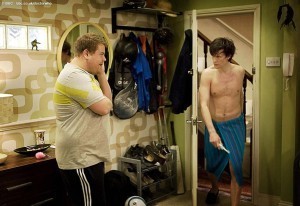 Arguably the most important story of the Eleventh Doctor vs. Domesticity is The Lodger, which has nothing to do with Amy Pond at all, but crystallises this particular Doctor’s interest in how humans work.
Arguably the most important story of the Eleventh Doctor vs. Domesticity is The Lodger, which has nothing to do with Amy Pond at all, but crystallises this particular Doctor’s interest in how humans work.
Stranded without the TARDIS, the Doctor investigates a new creepy house which, like the house Amy grew up in, is not what it seems. Again we see him trying to fit in with humans by parodying their behaviour, not always successfully. Where he does succeed, it’s often by accident – he cooks and plays football brilliantly, but is less than convincing when it comes to toothbrushes, money or emotional signals.
The story revolves around the top floor of a house that lures and kills people – a floor that was actually never there. It’s a neon sign as to what has been going on with Amy all along, but also represents one of the greatest horror tropes, the idea that the place where you live might not only not be safe – but might be trying to kill you.
It’s interesting really that this trope is so rarely applied to the TARDIS itself, the Doctor’s hearth and home. Though of course it is, many times during this season, and Amy herself is finding out how dangerous the TARDIS can be while all of the Doctor’s tea drinking and footballing is going on.
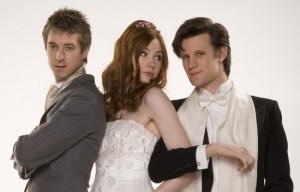 The mystery of Amy’s house is unravelled in the finale of Season 5 (though the mystery of the TARDIS blowing up is not) and she leaves the house behind without a backward look, wending her way into the universe with “her boys” as a married woman ready for adventures. This felt revolutionary at the time – the idea that a wedding doesn’t have to be the coda for ‘time to stop having fun’ or ‘second best to travelling with the Doctor’. I think it’s dangerous to only imagine weddings are the end of a story, a happy ending to strive for rather than the beginning of something new. We need more pop culture that says you can have your domesticity and swashbuckling at the same time.
The mystery of Amy’s house is unravelled in the finale of Season 5 (though the mystery of the TARDIS blowing up is not) and she leaves the house behind without a backward look, wending her way into the universe with “her boys” as a married woman ready for adventures. This felt revolutionary at the time – the idea that a wedding doesn’t have to be the coda for ‘time to stop having fun’ or ‘second best to travelling with the Doctor’. I think it’s dangerous to only imagine weddings are the end of a story, a happy ending to strive for rather than the beginning of something new. We need more pop culture that says you can have your domesticity and swashbuckling at the same time.
It was a magnificent end to a great season of Doctor Who, but I’m not convinced that what followed was anything close to the married-in-the-TARDIS hijinks we were promised.
Having a married couple in the TARDIS (and a baby of sorts) is a huge change of focus for the show, and while it’s good that it didn’t change the format too drastically (we don’t actually want the show to turn into The Pond Sitcom however cute that YouTube trailer was) it also felt like the show didn’t change enough. A cute married couple can absolutely bomb along with the Doctor in his rackety old TARDIS without making him change his habits too drastically, especially as they were doing so in the previous season as a romantic couple anyway – but why do something different with the companions only to then NOT do anything different with the companions?
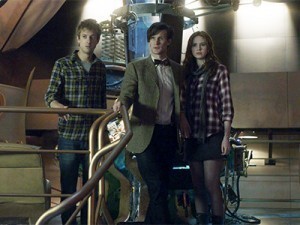 The Time and Space comic relief scenes are actually the closest we come to seeing ‘married person chatter’ or any real acknowledgement that something has changed. The funny revelation in The Doctor’s Wife that the room the Doctor set up for Amy and Rory features bunk beds (and he can’t imagine why they might not think they were awesome) and his embarrassed discussion with Madam Vastra about the conception of the baby go to show that actually, the Doctor has not had to compromise in order to make space for the Ponds in his life. They are still travelling with him on his terms, and he’s not even letting them partly set up home for themselves.
The Time and Space comic relief scenes are actually the closest we come to seeing ‘married person chatter’ or any real acknowledgement that something has changed. The funny revelation in The Doctor’s Wife that the room the Doctor set up for Amy and Rory features bunk beds (and he can’t imagine why they might not think they were awesome) and his embarrassed discussion with Madam Vastra about the conception of the baby go to show that actually, the Doctor has not had to compromise in order to make space for the Ponds in his life. They are still travelling with him on his terms, and he’s not even letting them partly set up home for themselves.
Indeed, we see that Rory is still unsure of where he stands with Amy well into Day of the Moon, and episodes like The Rebel Flesh two parter still prioritise the relationship of Amy as the Doctor’s main companion, with Rory as a sidekick. The controversial kidnapping of Amy by Madam Kovarian may put Amy in a traditionally passive role, but at least it forces the Doctor and Rory to work as a team, something we haven’t seen nearly enough of, and makes the TARDIS crew feel more united by the second half of the season.
Then there’s The Doctor’s Wife, another story about houses that are trying to kill you. It is a loving tribute to the TARDIS as the Doctor’s faithful companion (or rather, the Doctor as her faithful companion) and makes it clear that the show is really about the two of them. Companions come and go, but the TARDIS, the Doctor’s hearth and home, is always going to be there for him, and vice versa. The reason he has always fled domestic spheres in the past is not necessarily because it scares him or confuses him, but because he already has a wife and house waiting for him within those blue doors, and no one else compares to Her Indoors.
Wait, I’ve forgotten to address something.
The baby.
But that’s okay, because the show forgot to address it too!
I’m all for babies in my science fiction and fantasy. I’m a mum, and I love to see motherhood explored in my favourite genres. It’s not done nearly enough… and of course, it’s rarely done well. It drives me batty when a pregnancy or baby story is introduced to an ongoing science fiction series, usually to a female character, and then whisked away again, leaving little to no emotional ramifications. Think Deanna Troi and “The Child” in Next Generation. Also there’s the rapidly ageing baby trick, as with Connor in Angel or Eve/Livia in Xena. I don’t even like it when the show in question properly acknowledges how horrible an experience that is for the parent/s, because I’m well aware that the emotional trauma is a side effect of a cynical production choice, to dabble with a baby story but not bother with the realistic long term issues of how that would change a character’s life and priorities.
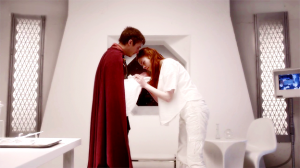 Which is relevant in the case of Season 6 of Doctor Who, because not only did they take the easy escape by writing the baby out almost as soon as it was born (and indeed skipping the inconvenient pregnancy period too) but they didn’t properly address the emotional ramifications of this to Amy or Rory for a full half of a season. Especially Rory, actually, as Amy at least gets to express her feelings in The Wedding of River Song, while we have to read his loss as a father from subtext in stories where he openly expresses other reasons to be dissatisfied with the Doctor.
Which is relevant in the case of Season 6 of Doctor Who, because not only did they take the easy escape by writing the baby out almost as soon as it was born (and indeed skipping the inconvenient pregnancy period too) but they didn’t properly address the emotional ramifications of this to Amy or Rory for a full half of a season. Especially Rory, actually, as Amy at least gets to express her feelings in The Wedding of River Song, while we have to read his loss as a father from subtext in stories where he openly expresses other reasons to be dissatisfied with the Doctor.
It’s a shame, because one or two sentences per episode throughout the second half of Season 6, to show the characters were still thinking about and dealing with this enormous loss would have made it a far more powerful, worthwhile storyline. My only hope is that the story isn’t over yet, and there’s a twist still to come. Recent revelations about the setting of the episode in which the Ponds will be written out only further support my theory that the story of baby Melody is not yet finished. (And you can see HERE my argument for why Amy Pond should not be killed off)
[another reminder that this essay was written before Season 7 screened! I decided to leave this piece as is and write a follow up rather than edit it with new perceptions]
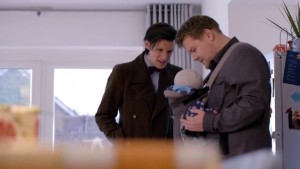 Domesticity and parent-child relationships are a huge part of Season 6, despite the baby-fail. The Doctor can barely turn around without being faced with more children, daddy issues and haunted and/or murderous houses. In Closing Time, he slapsticks his way through Two Men and a Stormageddon, and we are treated to a fun comedy of errors which deals with all kinds of great issues to do with the clash of domesticity, danger and dads. I particularly enjoyed the whole issue of – how do you save the world if you can’t get a babysitter?
Domesticity and parent-child relationships are a huge part of Season 6, despite the baby-fail. The Doctor can barely turn around without being faced with more children, daddy issues and haunted and/or murderous houses. In Closing Time, he slapsticks his way through Two Men and a Stormageddon, and we are treated to a fun comedy of errors which deals with all kinds of great issues to do with the clash of domesticity, danger and dads. I particularly enjoyed the whole issue of – how do you save the world if you can’t get a babysitter?
So… why couldn’t this be done with Melody Pond? Why couldn’t we have a baby in the TARDIS, stick a robot nanny in with the Gallifreyan crib, and tell the story that way? It’s not like we were going to be stuck with her forever, they’re only keeping the Ponds another five episodes into Season 7!
James, a regular commenter on Doctor Her, expresses fan frustration with this issue beautifully in a comment on another post, which had me punching the air in agreement:
Night Terrors looks particularly bad owing to its position in the series. One episode after Amy and Rory have realised that their baby’s not going to grow up with them, the Doctor takes them off to rescue a complete stranger’s son. You do have to wonder why one of them doesn’t just lamp him. Probably just as well they’re not around for most of “Doctor, Widow and the Wardrobe”. You can imagine the dialogue.
“So, Doctor, where are we going?”
“Well, Amy, there’s these two children of a woman who I met once for 10 minutes and I want to put a disproportionately huge amount of effort into getting them Christmas presents.”
“RORY! Get Romaned up and fetch a shovel. You kill him and I’ll dig the grave.”
So, the Doctor has a married couple in the TARDIS (mostly) but he doesn’t have to change his spots. They have a baby, but while there are all manner of timey wimey consequences, it’s hardly even worth the Doctor dusting off that old cot of his. Then, to cap it all off, the Doctor gets married (to someone who isn’t the TARDIS though you could definitely say River is TARDIS-approved) and is in no way expected to live with, change or compromise anything for his new bride.
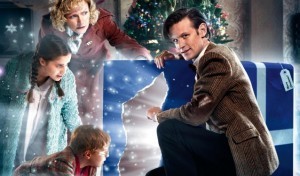 And yet… maybe he isn’t living as fancy free as we think – at least, not by choice. If we learn anything from The Doctor, the Widow and the Wardrobe, it’s that this Doctor rather likes playing house. He creates a Christmas home for Madge and her children, and afterwards, goes home to Amy and Rory – the same home he bought for them, something he’s never done for a companion before. Another Doctor at Christmas dinner, but this time it’s all his idea.
And yet… maybe he isn’t living as fancy free as we think – at least, not by choice. If we learn anything from The Doctor, the Widow and the Wardrobe, it’s that this Doctor rather likes playing house. He creates a Christmas home for Madge and her children, and afterwards, goes home to Amy and Rory – the same home he bought for them, something he’s never done for a companion before. Another Doctor at Christmas dinner, but this time it’s all his idea.
Somehow, the Doctor has ended up with a real family, not one he visits in order to placate his current companion, but one that includes him as official, full fledged son-in-law. It’s not a permanent thing – Amy and Rory’s days with the show are numbered, and they’ll be gone by Christmas – but it’s hard to imagine that the Doctor hasn’t somehow been irretrievably changed by this development.
Looking back over the Seasons 5 and 6, I wonder if maybe all the kids and killer houses were not about showing us what the Doctor (and those who travel with him) can’t have, but about what this Doctor might be looking for in the future. Eleven didn’t have to marry River, or provide a home and car for Amy and Rory. He certainly doesn’t have to fly through space with a cot in his TARDIS, all ready for some future occupant. No once forced him into doing those things.
Is this as domesticated as our hero is ever going to get, or is it the beginning of a new direction for Doctor Who? As long as Moffat is involved in the show, it’s pretty clear that it will be daddy issues ahoy. And that means there’s one fairly obvious next step that the show could take.
Could the Eleventh Doctor become a parent – a real, involved, doing-the-dirty-jobs-while-saving-the-world parent – without breaking the show irretrievably? It would certainly make a change from all those romantic companions, if the next woman to join him in the TARDIS was his daughter…

"Booties... doesn't look too hard!"
PREVIOUS DOMESTICATING THE DOCTOR POSTS:
Cocoa, Test-tubes and the Classic Years
The Missus, the Ex and the Mothers-in-Law
John Smith’s Human Nature
Come back next week for two new posts in this series: Divorcing the Ponds and Souffles in the Tardis!
January 8, 2013
Tales from the Library: Parade’s End Won’t
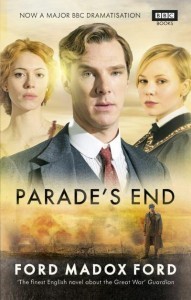 I want to write more about what I’m reading this year. Not book reviews as such, because I burnt myself out on formal book reviews a few years back, but I’d like to do more of the written equivalent of what we do on Galactic Suburbia – chatting about current reading.
I want to write more about what I’m reading this year. Not book reviews as such, because I burnt myself out on formal book reviews a few years back, but I’d like to do more of the written equivalent of what we do on Galactic Suburbia – chatting about current reading.
Which is how I end up here, talking about a book I haven’t finished yet! But oh, READING Parade’s End by Ford Madox Ford has taken up so much of my thoughts and reading energy over the last couple of weeks, I am not sure I will have the strength to write about it at all when I finally make it over the finish line.
I ordered Parade’s End from the local library because there’s an adaptation with Benedict Cumberbatch which I plan on seeing at some point. I thought for once, how about I read the book first? But whoa, what a whopper! At over 800 pages, it turns out that it’s actually four books in one.
I didn’t start reading until the book was already overdue at the library, and I couldn’t get an extension because someone else had ordered it. So I dived in and discovered a magnificent, crunchy, difficult story that I had to pay constant attention to.
Parade’s End is the story of Christopher Tietjens, his occasionally estranged and cruel wife Sylvia, and the young Suffragette, Valentine Wannop, with whom he falls in love but can’t quite manage to arrange an affair with. All three of them are so fucked up they can’t see straight, Christopher in particular being something of an emotional cripple, and they lurch their way through the entire First World War, hurting each other and having strained conversations and managing to barely grasp anything like happiness with their fingertips.
It’s wonderful. As a broken story of broken people (and by an extension, the broken world order of English aristocracy before and during the war) it is extraordinary. As a trained genre reader, it feels like Ford does everything wrong. Seriously, he breaks every rule I’ve ever heard about writing. The story is almost constant flashback or flashforward – he darts around the personal history of these characters like a flighty psychotherapist, filling stories from the past out with great relish and far more significant emotional detail, sometimes multiple times. He skips forward in time with great abandon, then pulls in tight for a minute-by-minute examination of an awkward dinner party. We miss all the important bits, then discover them through stilted interrogation between characters, all of whom are slightly unreliable narrators even (especially) when talking to each other.
But most of all, I’m captured by Sylvia. She’s the kind of character who would earn unrelenting fangirl hatred if written today – and I haven’t dared check what Tumblr thinks of her in the TV version – but I am always really impressed when a writer takes a character I would never like and makes them compelling and sympathetic. Sylvia does awful things in this book, mostly to get the attention of her emotionally closed-off husband (it never works) and they so often rebound not only upon Christopher but on herself, and yet I am compelled by the scenes in her point of view because she is so very alien, and I want to know what she will do next.
Christopher Tietjens has to be the most frustrating fictional character ever, and the fact that he is married to Sylvia is a wild and deliberate cruelty on behalf of the author.
But yes, I’m loving this book even though it goes on forever and I have to pay attention to every word (Talk about cruelty) because every time I blink or get distracted, something like an unexpected court martial happens, or we flick forward three years. I ended up taking the book back to the library half finished and bought it on the Kindle.
Unfortunately the combination of the crazy long book and “starting” it in the middle seems to have messed with the head of my Kindle Paperwhite which has been insisting that there is always two hours and twenty nine minutes to the end of the book, no matter how much I read.
If I never read another book, you’ll know what’s happened. Parade’s End continued endlessly into my future and I – could – not – stop – reading it.
January 7, 2013
What Katy Said [WHO-50—1971]
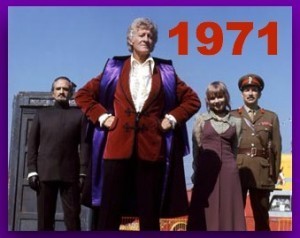 The surreal thing about listening to DVD commentaries of the Pertwee era is not how many of the participants are no longer with us, but how recently they have died. Producer Barry Letts, actors Nicholas Courtney, Caroline John and Elisabeth Sladen all passed away within a handful of years, but thanks to DVD schedules, we have some very recently-released (and even some yet to be released!) DVD commentaries featuring their voices. In the case of Terror of the Autons (released in 2011), Katy Manning is now the only survivor of the commentary, which is unbelievably sad especially considering the close friendships of the people who made the show in this era.
The surreal thing about listening to DVD commentaries of the Pertwee era is not how many of the participants are no longer with us, but how recently they have died. Producer Barry Letts, actors Nicholas Courtney, Caroline John and Elisabeth Sladen all passed away within a handful of years, but thanks to DVD schedules, we have some very recently-released (and even some yet to be released!) DVD commentaries featuring their voices. In the case of Terror of the Autons (released in 2011), Katy Manning is now the only survivor of the commentary, which is unbelievably sad especially considering the close friendships of the people who made the show in this era.
When Katy, Nicholas or Barry talk about Jon Pertwee or Roger Delgado on this commentary it’s with pride and sadness, and it feels like they are enjoying the opportunity to capture those friendships one more time.
The cozy camaraderie of this era of the show has always been reflected in the DVD commentaries, though just as the enjoyment of the cast often translates to a story (like The Daemons) taking on a particular shine with fans, I wonder how many negative descriptions/myths about this era also originate from the well-honed anecdotes of the show regulars. Their merry in-joke jibing about Jo being ditzy and asking all the handy questions has I think taken on far too much weight as Received Fan Wisdom – she is a far more interesting character than her creators give her credit for, and one of the few companions who had a narrative arc through the time she was with the show. We see her grow up! Jo is one of my absolute favourites, and I swear it’s not just because of her adorable outfits.
Nicholas Courtney is surprisingly low-key in the Terror of the Autons commentary, which is mostly the Barry Letts and Katy Manning show. Katy in particular is rather lovely to listen to, as she laughs and teases her way through the story, mocking all the silly bits and putting on funny voices. Considering the story itself doesn’t have much humour in it (though it is a historically significant one, with the introduction of the Master and Mike Yates as well as Jo herself), her perspective certainly livens things up!
Katy on the props they had to work with in 1971.
Katy on the legendary Roger Delgado – she claims that he pretty much hypnotised her in the scenes where the Master did the same thing to Jo. This technique of the Master’s was later dropped as being far too convenient for him.
Katy on the dramatic height difference between herself and Jon Pertwee – she also claimed he was in a “constant state of plié,” in order to squeeze down to her level for most camera shots.
In between all the snark and giggles, though, Katy also makes a few more serious reveals. I really enjoyed her rant about the cruelty to animals in circuses, and how this clashed with Jon Pertwee’s ‘showman’ routine – and also her rather pointed comment that people tended to assume that she was playing herself on screen, even to the point of giving her the credit for Jo’s wardrobe, when in fact she was an actress playing a character.
That last point is one that most fandoms could stand to remember…
ELSEWHERE ON 1971
Terror of the Autons [The Angriest]
Terror of the Autons (in images) [llywela13 on Tumblr]
Terror of the Autons: Plastic & Pertwee [Fangirl Knits Scarf]
The Mind of Evil [Chronic Hysteresis]
Claws of Axos [Hoo on Who]
Colony in Space Episode 6 [Chronic Hysteresis]
The Daemons [Kasterborous]
Jo Grant & Captain Mike Yates [Marlow Inc on Tumblr]
January 6, 2013
Domesticating the Doctor III – John Smith’s Human Nature
First published on Doctor Her at 4 April 2012. I’ve also changed the numbering system because having a 2.5 was a bit silly…
Previously in “Domesticating the Doctor” I looked at The Classic Years, which included a granddaughter in the TARDIS, an unexpected Aztec cocoa marriage and the Third Doctor being house-trained by Benton and the Brigadier. I also looked at the RTD era of New Who, with particular reference to the three central female characters of this period, and their mums, with The Missus, the Ex and the Mothers-in-Law.
However, I did miss out one particularly important bit…
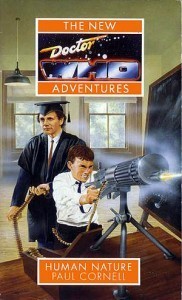 Human Nature/The Family of Blood is the most significant New Who story to fully address the issue of the Doctor v. Domesticity, so worthy of a post all on its own.
Human Nature/The Family of Blood is the most significant New Who story to fully address the issue of the Doctor v. Domesticity, so worthy of a post all on its own.
Adapted from the original New Adventures novel, Human Nature (featuring the Seventh Doctor and also written by Paul Cornell) this story introduces us to John Smith, a man who dreams of being a Time Lord that saves the world and has fantastical adventures, but in reality is a rather quiet, unassuming teacher at a boys school in England, 1913.
Except of course, he isn’t. The Doctor is hiding from a devastating if short-lived alien family who want to drink the Time Lord right out of him. The only solution (apparently) was to use a Gallifreyan fob watch to transform himself into a human, with no memories or knowledge of the Time Vortex.
Martha, in disguise as a maid at the school, is the only one who knows the truth about her Doctor, a man who can no longer recognise her.
The Family of Blood are closing in, the country hovers on the brink of a different kind of war, and in all this, John Smith manages to fall, rather awkwardly, in love with Joan Redfern, the school matron. The Doctor planned for every contingency except the possibility of romance… and Martha has no idea how to handle it.
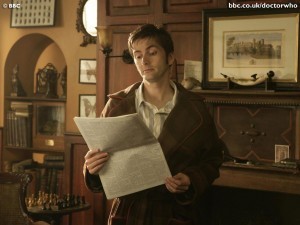 The contrast between John Smith and the Doctor is noticeable in every scene – this is not just a mortal, one-hearted version of the Time Lord we normally follow around. John Smith is nervous around women, he gabbles about his strange dreams and is a bit wet, frankly. But he takes on a different persona around the boys, not flinching from the casual violence that is part of the school routine, and getting offended when Martha gets ideas ‘above her station.’
The contrast between John Smith and the Doctor is noticeable in every scene – this is not just a mortal, one-hearted version of the Time Lord we normally follow around. John Smith is nervous around women, he gabbles about his strange dreams and is a bit wet, frankly. But he takes on a different persona around the boys, not flinching from the casual violence that is part of the school routine, and getting offended when Martha gets ideas ‘above her station.’
There are class issues running rampant through this story, and it’s noticeable that Tennant affects a far posher accent than usual to play the educated gentleman teacher John Smith.
When people start dying, the Doctor is desperately needed, but that means that John Smith has to die. And he doesn’t want to. He protests at having to give up the simple life he has here, and his newfound love with Joan, to let the madman in the box take over his body again.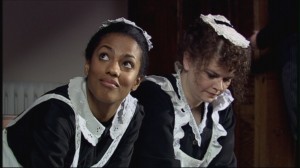
Paul Cornell has provided some fascinating insights into the Doctor in this story, and I particularly like the way that he portrays the uncomfortable aspects of this time period – from the racist comments directed at Martha from the privileged male students, to the maids drinking outside the pub because women can’t sit inside, to the boys volunteering to give each other beatings, and practicing with real guns for the coming war. Most discomfiting of all is the revelation of how ruthless the Doctor can be, and what a lonely figure he is.
Joan, who might look on paper like the kind of passive female character that SF fans deride and dismiss in favour of the girls with low cleavage and big guns, is actually strong and secure enough in herself to call the Doctor on his bullshit, despite the fact that he looks so much like the man she loved. Both she and John Smith, in fact, are equally scathing of the kind of person the Doctor is, and his priorities. Considering we most often see the Doctor through the eyes of people who adore him – such as Rose, Martha and Jack – it’s always refreshing to have characters who are good people, and yet completely disagree with the Doctor, and are not proved wrong in the context of the narrative.
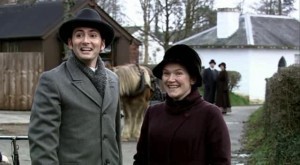 There’s not actually a lot of domesticity evident in the story, despite the premise. John Smith may be sacrificing a future as a husband and father to let the Doctor save the day, but apart from that brief glimpse of the lost future with Joan, we mostly see him at work, or at war. But domestic scenes are used, to illustrate how comfortable John Smith is in this school (his study is so cozy that I want to live there!) and the contrasting horror of the Family of Blood, who literally steal bodies and kill families.
There’s not actually a lot of domesticity evident in the story, despite the premise. John Smith may be sacrificing a future as a husband and father to let the Doctor save the day, but apart from that brief glimpse of the lost future with Joan, we mostly see him at work, or at war. But domestic scenes are used, to illustrate how comfortable John Smith is in this school (his study is so cozy that I want to live there!) and the contrasting horror of the Family of Blood, who literally steal bodies and kill families.
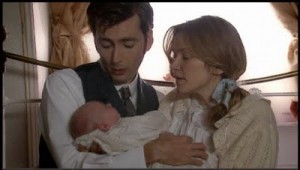 The scene in which Joan shows that she has already figured out not only that the Cartwright girl possessed by Sister of Mine is dead, but her whole family is dead too, is quietly horrible. It shows what kind of person she is, though – thoughtful, compassionate and very pragmatic. The Cartwrights are dead, but their house might shelter the rest of them.
The scene in which Joan shows that she has already figured out not only that the Cartwright girl possessed by Sister of Mine is dead, but her whole family is dead too, is quietly horrible. It shows what kind of person she is, though – thoughtful, compassionate and very pragmatic. The Cartwrights are dead, but their house might shelter the rest of them.
And while we’re talking about domestic horror, let’s look at the Family themselves – a parasite group of aliens who take over bodies of humans, including children, in their quest for immortality. Their use of familial names and language with each other only make their more sinister acts more horrible – but also make them feel like rich, developed characters, which is in turn more disturbing when the Doctor gets his revenge on them.
More than anything, this story explores the idea of what the Doctor would need to lose, in order to have an “ordinary” life. Which is an odd sort of thing, really, because an “ordinary” life for the Doctor shouldn’t involve Earth or humans at all.
What shall we do tonight, guys? Pizza, booze, telly?
What was Gallifreyan domesticity like? We never got to see those parts, on our brief visits. Do they have robot maids to dust all those shiny white surfaces, or nano genes to do the washing up? Certainly we get the impression that Time Lords, the educated aristocracy of the Doctor’s home planet, are at the very top of the class pyramid, which makes the comparison to the boys at this school all the more apt.There’s a lot in this story about the traditional ideas of masculinity, and the historical tradition of incredibly young men going to war. Which nicely foreshadows a story coming later in the season, of two very particular men at war with each other, and the planet they have lost.
In this particular duel of Domesticity vs. The Doctor, the Doctor wins, but it’s a Pyrrhic victory (nobody really wins). Having seen John Smith react in horror to the idea of turning back into a man who is the very definition of inhuman, it’s oddly anti-climactic to realise that the Doctor is back, pulling switches and blowing up spaceships like usual. And he killed a man to do it. Took him over with his own personality… just like the Family of Blood did with their victims.
Tennant is brilliant in this episode. Both characters feel so utterly him, and yet you never doubt the difference between them for a moment. Jessica Hynes (I can’t get used to her not being Stevenson) is also brilliant as Joan Redfern – subtle and affecting. The final scene in which she faces the Doctor with all that anger and hurt pushed down deep inside her is incredibly powerful.
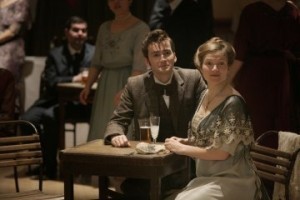 We’ve seen the power the Doctor has to hurt Martha with his romantic indifference to her, but that’s nothing to the casual cruelty he demonstrates at the end of this story, when he suggests Joan come along in the TARDIS, as if she can set aside her grief and loss as easily as he removed John Smith from himself, joining him and Martha for great intergalactic larks and cherry cake. He honestly doesn’t seem to realise what he has done, and how badly he has treated her – and yet how else do you explain the other cruelty he displays just before this scene, when he condemns each of the Family of Blood to eternal life? Was it the Doctor or John Smith who decided on their fates?
We’ve seen the power the Doctor has to hurt Martha with his romantic indifference to her, but that’s nothing to the casual cruelty he demonstrates at the end of this story, when he suggests Joan come along in the TARDIS, as if she can set aside her grief and loss as easily as he removed John Smith from himself, joining him and Martha for great intergalactic larks and cherry cake. He honestly doesn’t seem to realise what he has done, and how badly he has treated her – and yet how else do you explain the other cruelty he displays just before this scene, when he condemns each of the Family of Blood to eternal life? Was it the Doctor or John Smith who decided on their fates?
One thing seems certain, the ultimate message of this story is that if the Doctor stops running, and falls in love, and gets a job and a home, and has a family… then he wouldn’t be the Doctor any more. Or at least, to have and do all those things, he would have to stop being the Doctor first.
Which all ties in to the ongoing theme of these essays – that domesticity and the Doctor don’t fit together comfortably, unless one of them is prepared to change pretty radically. And the Doctor never changes. Right?


